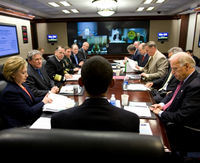During the 2008 presidential campaign, Barack Obama famously declared that he was running for the nation's highest office not simply to end the war in Iraq, but to change the mindset that got America involved in Iraq in the first place. More than a year into his presidency, he is discovering that such a seminal transformation is far easier said than done.
From Afghanistan and Guantanamo Bay to repairing America's impaired global image, precious energy and political capital is being spent extricating America from the disastrous impact of the Bush administration's stewardship of U.S. foreign policy. But as catastrophic as the individual policies were, the greatest damage of the Bush years may have been in diverting U.S. attention away from the fundamental transformations taking place in the global arena, changes on which Obama and his foreign policy team are now being forced to play catch-up.
More and more, the underpinnings of American power are being challenged by a host of aggressive and increasingly prominent transnational and non-state forces. While the U.S. maintains its fixation on the threat of jihadist terror, a new and arguably more pressing set of global issues have emerged -- including climate change, migration, global health pandemics, cybersecurity threats, nuclear proliferation and illicit criminal networks. A 21st-century national security strategy must prioritize these issues and place them front and center in the policymaking process.

